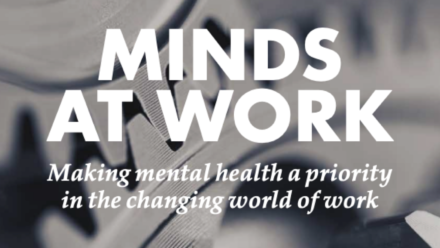
Our jobs make up a huge part of our lives and poor practice in the workplace can damage our mental health. This fact, often overlooked by policy makers, is becoming more pertinent as the world of work changes around us and job insecurity increases.
Zero-hours contracts, bogus self-employment and the emerging gig economy are all taking their toll on workers on the frontline. New Fabian Society research – published in Minds at Work, a report by the joint Fabian-Community initiative the Changing Work Centre – highlights a steep increase in the number of self-employed workers with a mental illness. Over just five years, the number has almost doubled, rising from 105,000 in 2012 to 203,000 in 2017.
Although the government is taking some steps to improve mental health provision, there is still a long way to go. The most recent budget contained a commitment of £2bn to pay for a 24-hour mental health hotline, more mental health specialist ambulances and new mental health crisis centres in every major A&E by 2023-24. These new measures are welcome. But there has been insufficient focus on the interaction between mental health and the world of work.
In this sense, Labour’s offer is better suited to the challenge. Shadow mental health minister Barbara Keeley has set out a holistic approach that prioritises preventative strategies and infrastructure investment to improve the environment in which we work. Other Labour policies will contribute to minimising the conditions in which workplace mental ill-health develops: banning zero-hours contracts, ensuring that contracts reflect hours actually worked, and extending the rights of employees to all workers.
But a future Labour government should go further. A key starting point must be the government-commissioned independent review of mental health and employers, Thriving at Work. As the review recommends, we need to look again at the Equality Act to ensure it provides sufficient protections for those with fluctuating mental health conditions. We also need to see considerable reform to statutory sick pay to make it more flexible, and increase the rate at which it is paid.
Going beyond Thriving at Work, a truly bold Labour government would address inequalities in the way the social security system treats different kinds of workers – especially when we have seen such a steep rise in the number of self-employed people reporting a mental illness. There should be a government-backed collective insurance scheme to protect the incomes of the self-employed in periods of ill-health, as recently recommended by the Royal Society of the Arts.
And we must not forget that government is itself an employer. A survey conducted by Mind last year found that, compared to their private sector counterparts, public sector workers are more likely to have poor mental health, more likely to take time off for mental ill-health and less likely to feel supported when they disclose problems.
There is a lot that employers can do to improve the mental health of their workforces. A common theme running through the interviews we conducted with workers was the importance of training to ensure that managers are working to a higher standard when it comes to taking care of employees’ wellbeing. Employers of all sizes should be providing training for managers within workplaces – and the government should commit to providing funding to bear the costs for small and medium-sized enterprises. Additionally, businesses should be required to make provision for mental health first aid, just as they are for physical first aid.
Where government cannot or will not take the lead, trade unions can direct resources to ensure workers have someone to turn to when they are experiencing mental health difficulties. Unions such as Community have been leading on this in workplaces throughout the country, training their members and reps on mental health first aid. In workplaces where a union is recognised, unions should formally integrate mental health into its branch structures, perhaps through additional responsibilities for health and safety reps. Reps can investigate potential mental health hazards, consult with the employer about mental health issues in the workplace and help deal with members’ mental health-related complaints.
To tackle our mental health crisis and ensure we are prepared for the changing world of work, employers, unions and government will need to work together. By focusing on the workplace, the causes of mental ill-health can be reduced and support provided to those who urgently need it.
Josh Abey is a researcher at the Fabian Society and Kate Dearden is research and campaigns officer at Community.




More from LabourList
Letters to the Editor – week ending 15th February 2026
‘Labour council candidates – it’s tough, but all is not lost’
‘Labour won’t stop the far right by changing leaders — only by proving what the left can deliver’